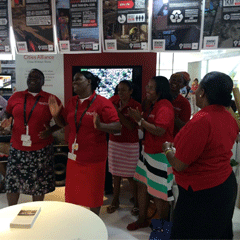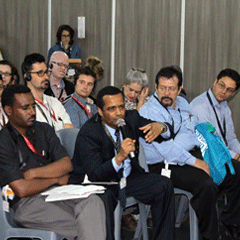[25 April 2014] -- As the world’s largest gathering devoted to cities, the World Urban Forum (WUF) is one of the biggest events on the Cities Alliance calendar. It provides unparalleled opportunities for knowledge sharing, learning and networking on the critical urban issues of the day, as well as the chance to showcase the strength of the Cities Alliance partnership.
The Forum’s seventh session, held in Medellín, Colombia from 5 April to 11 April 2014, did not disappoint. Centred on the theme “Urban Equity in Development – Cities for Life,” it drew over 22,000 participants from more than 140 countries representing governments, UN agencies, and nongovernmental organisations (NGOs), urban professionals, local authorities and academics.
The host city of Medellín was a particularly appropriate location for the global event. Both at the Forum and in the surrounding hillside settlements, the international community had the chance to witness an international best practice of urban transformation through social urbanism. A concept pioneered by Medellin, social urbanism involves focusing resources on the poorest and most violent parts of the city to achieve an overall culture of transformation.
Its success was evident all over the city. Both physically and institutionally, Medellín has prioritised vulnerable communities with solutions for accessible mobility, inclusive governance and quality education – all while recovering public space and green areas throughout the city.
The spirit of Medellin’s transformation, combined with strong private sector participation in the event’s exhibition area, made this year’s WUF an exceptionally vibrant one and brought a welcome energy to the urban debate.
Sharing Cities Alliance knowledge
Vibrant is also an apt description for the Cities Alliance’s booth in the Plaza Mayor exhibition hall. As in previous years, the Cities Alliance booth attracted a wide range of visitors, from Ministers and mayors to urban planning students and local residents from Medellín. It was also focal point for Cities Alliance members, who networked, held small bilateral meetings, and held a range of interactive presentations, including:
-- Launch of the fifth annual Reducing Urban Poverty competition and presentation of former winners, organised by the Cities Alliance, USAID, the Wilson Centre, the World Bank, and the International Housing Coalition
-- Launch of the joint UNEP/Cities Alliance report Integrating the Environment in Urban Planning and Management
-- Cities Alliance cocktail reception and pre-book launch on the System of Secondary Cities, our flagship report that is expected to be released later this year
-- A presentation on the Dakar Municipal Finance Project, in which the city of Dakar, Senegal is pioneering an effort to become one of the first cities in Sub-Saharan Africa to launch a municipal bond in the regional market
-- A joint WIEGO/SDI/Cities Alliance “City Walk” around the Cities Alliance booth, titled Citizens and the City Working Together.
A highlight of the Cities Alliance’s participation in the Forum was our very well-attended networking event on Secondary Cities – Key Links for Equitable and Sustainable City Systems, co-hosted by the Inter-American Development Bank (IADB). Chaired by Ms. Clare Short, around 120 participants interacted with the panel that included representatives from the National Planning Department Colombia, United Cities and Local Governments (UCLG) and the IADB.
Based on key inputs provided by Prof Brian Roberts from the University of Canberra, author of the forthcoming Cities Alliance publication The Systems of Secondary Cities, the discussion culminated in an agreement that the role of secondary cities is mostly overlooked in contemporary development approaches – a missed opportunity, because these cities can turn out to be crucial drivers of urbanising and thriving economies.
The Cities Alliance Secretariat itself was also asked to provide expert input on a range of learning events. Director William Cobbett, Regional Adviser for Latin America Anaclaudia Rossbach, and Sr. Urban Specialist Dr. Rene Peter Hohmann all served as panelists on a variety of round tables, networking sessions and side events. (Read Dr. Hohmann’s presentation on National Urban Policies as a mobilising process for constituencies and development partners.)
After five full days of rich discussion and debate, participants of WUF 7 adopted the Medellín Declaration, which recognises the transformational power of cities and describes equity as the foundation of sustainable urban development. Signatories also call for the inclusion of an urban Sustainable Development Goal (SDG) in the post-2015 development agenda – a goal the members of the Cities Alliance wholeheartedly support.

Members of SDI’s national slum dweller federations from Zimbabwe and South Africa participate in the "City Walk" event at the Cities Alliance booth. Photo:Omar Siddique/Cities Alliance
“Due to the superb host city and its rich experience in turning development challenges into opportunities for all citizens, this World Urban Forum set a benchmark for showcasing how an exchange of international practices can be done.” -- Cities Alliance Sr. Specialist Dr. Rene Peter Hohmann

Ethiopian Minister of Urban Development and Construction Mekuria Haile at the Cities Alliance networking event on Secondary Cities. Photo: Rene Peter Hohmann/Cities Alliance
Related Items




